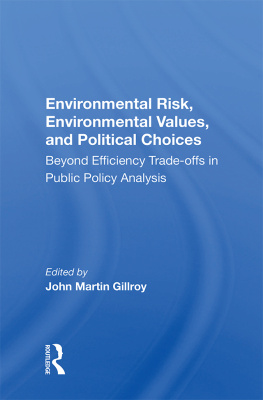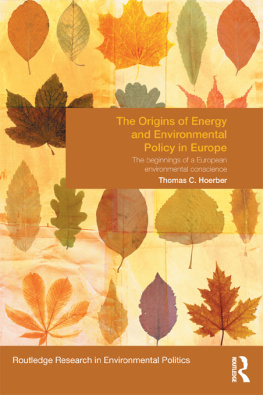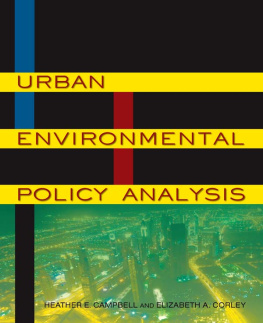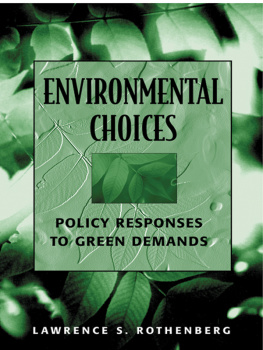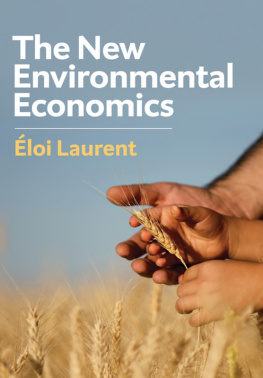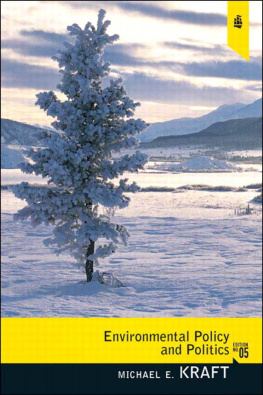Environmental Risk, Environmental Values, and Political Choices
Environmental Risk, Environmental Values, and Political Choices
Beyond Efficiency Trade-offs in Public Policy Analysis
Edited by
John Martin Gillroy
First published 1993 by Westview Press, Inc.
Published 2018 by Routledge
52 Vanderbilt Avenue, New York, NY 10017
2 Park Square, Milton Park, Abingdon, Oxon OX14 4RN
Routledge is an imprint of the Taylor & Francis Group, an informa business
Copyright 1993 Taylor & Francis
All rights reserved. No part of this book may be reprinted or reproduced or utilised in any form or by any electronic, mechanical, or other means, now known or hereafter invented, including photocopying and recording, or in any information storage or retrieval system, without permission in writing from the publishers.
Notice:
Product or corporate names may be trademarks or registered trademarks, and are used only for identification and explanation without intent to infringe.
Library of Congress Cataloging-in-Publication Data
Environmental risk, environmental values, and political choices:
beyond efficiency trade-offs in public policy analysis / edited by
John Martin Gillroy.
p. cm.
Includes bibliographical references and index.
ISBN 0-8133-8147-9
1. Environmental policyCongresses. 2. Human ecologyMoral and
ethical aspectsCongresses. 3. TechnologyRisk assessmentSocial
aspectsCongresses. I. Gillroy, John Martin, 1954- .
HC79.E5E586 1993
363.7dc20 92-45788
CIP
ISBN 13: 978-0-367-01612-8 (hbk)
Contents
John Martin Gillroy
John Martin Gillroy
Steven Kelman
Robert C. Paehlke
Vzcente Medina
Christopher J. Bosso
David E. Henderson
William C. Gunderson
Talbot Page
Barry G. Rabe and John Martin Gillroy
Douglas MacLean
Guide
This collection of essays has grown from discussions among the authors on the subjects of philosophy, public policy, and environmental risk. These discussions were aided by the meeting of most of the contributors at a symposium held on the campus of Trinity College on March 16, 1990. Entitled "Environmental Policy in the '90s and Beyond: Science, Human Values, and Political Choices," the symposium was partially underwritten by Trinity's New Liberal Arts Grant from the Sloan Foundation. At this meeting it was jointly decided to express our concerns on this subject by writing essays that could be gathered together in book form.
The editor wishes to acknowledge the Sloan Foundation, J. Ronald Spencer, Andy Gold, Dan Lloyd, Glen Gross, Paul Diaz, and Steven Jud for their tireless help in putting together the symposium that encouraged the writing of these essays. I would also like to thank my wife, Margaret Murray, for her patience and editorial assistance; Amy Eisenberg of Westview Press for her faith in this project; and, most especially, Marilyn Brazil, for her help in the preparation of this book. Without Marilyn the task could not have been accomplished.
John Martin Gillroy
Christopher J. Bosso is associate professor and chair of the Department of Political Science at Northeastern University, Boston, Massachusetts. He is the author of Pesticides and Politics: The Life Cycle of a Public Issue and has current research interests in public policy processes (particularly agenda setting) and environmental interest group formation.
John Martin Gillroy is assistant professor and Dana Faculty Fellow in the Department of Political Science and director of the Public Policy Studies Program at Trinity College in Hartford, Connecticut. His primary interest is in the relationship between (normative and positive) political thought and public policy choice, with special emphasis on the use of Immanuel Kant's ethical and political theory in the formulation and prosecution of policy argument.
William C. Gunderson is professor of political science at Carthage College in Kenosha, Wisconsin. Since pursuing his doctoral research in the Korhogo Region of the Ivory Coast in the early 1970s, he has been interested in center-periphery relations. During the 1980s, he spent a sabbatical leave and four years on the Racine County Board of Supervisors examining the implementation of national and state policy at the county level. In 1990, he moved to Montpellier, France, where he examined changes in local politics given the early 1980s' decentralization reforms.
David E. Henderson is professor of chemistry at Trinity College in Hartford, Connecticut, and director of the college's Interdisciplinary Science Program. He has written on air pollution for the World Book Encyclopedia and has recently published a monograph entitled Air Pollution and Risk Analysis. He is currently developing a program to allow chemistry students at a number of colleges in the northeast to monitor acid rain as a part of their general chemistry laboratories.
Steven Kelman is professor of public policy studies at the John F. Kennedy School of Government, Harvard University, Cambridge, Massachusetts. He is author of many books and essays, including
What Price Incentives? Economists and the Environment, a seminal treatise on the use of the principle of efficiency in making environmental policy decisions.
Douglas MacLean is presently chairman of the Philosophy Department at the University of Maryland in Baltimore. Formerly he was director of the Institute for Philosophy and Public Policy at the University of Maryland, College Park. He is editor of Values at Risk and author or editor of many other books and essays on policy matters.
Vicente Medina is assistant professor of philosophy at Seton Hall University, South Orange, New Jersey. His interests include social contract theory and the relationship between environmental policy and moral values.
Robert C. Paehlke teaches in the Political Science Department and the Environmental and Resource Studies Program at Trent University, Peterborough, Ontario, Canada. He is the founding editor of the journal Alternatives: Perspectives on Society, Technology and Environment. His recent publications include Environmentalism and the Future of Progressive Politics and Managing Leviathan: Environmental Politics and the Administrative State.
Talbot Page is professor of economics at Brown University, Providence, Rhode Island. His studies have included environmental regulation, policy analysis, decision theory, normative economics, moral philosophy (amateur standing), incentive compatibility, game theory and its "rationality" foundations, and epidemiology of drinking water, all of which relate to the understanding and control of environmental problems. He is author of Conservation and Economic Efficiency.
Barry G. Rabe is associate professor of health politics in the School of Public Health and adjunct assistant professor in the Department of Political Science at the University of Michigan, Ann Arbor. He is the author of Fragmentation and Integration in State Environmental Management and coauthor of When Federalism Works. He is currently researching North American hazardous waste policy and environmental regulatory integration in the Great Lakes Basin.
John Martin Gillroy
The purpose of this collection is twofold. First, we argue that environmental risk, as a policy problem, requires moving beyond the market principle of efficiency as the basis of decision making and toward the articulation and use of environmental values to produce good public choices. Second, we examine the conflicts between environmental values and other competing value systems, especially concerning the instrumentalist values of the market paradigm.

